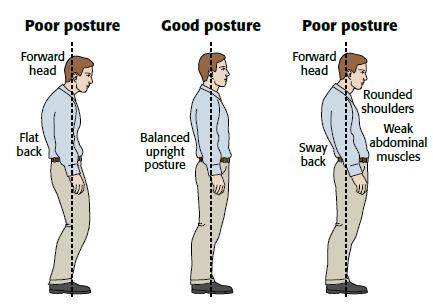Causes of Postural Defects – Overview
Poor posture is the posture that results from certain muscles tightening up or shortening while others lengthen and become weak, which often occurs as a result of one’s daily activities.
Postural defects may lead to pain, injury, or other health problems.
There are several causes of postural defects ranging from daily activities, diseases to age. Here we will be expatiating on the causes of postural defects.

Causes of Postural Defects
Causes of Postural Defects
1. Age
As we age, we usually begin to stoop lower and lower to the ground—oftentimes because our bodies become less flexible and agile. Naively, we avoid movement and exercise altogether because we think
2. Computer use
The use of computers and other related technology has been associated with spinal distortions and ultimately poor posture.
Whether you sit at a computer all day, use a tablet or cell phone or work with several devices at once, can quickly take your body out of alignment.
If you text incessantly, you may develop text neck, which is a condition in which your neck is held in too much flexion, or forward bending, for too long. This may lead to pain.
3. Fashion

Causes of Postural Defects
Abysmal fashion could lead to poor posture. Too tight of clothing, high heels and heavy bags can all cause back pain for one reason or another.
Heels throw your body weight forward which can easily catapult you into misalignment.
Also, backpacks favor the anterior leaning of the upper portion of the body. The weight of the backpack causes the shoulders to slump forward to compensate for the extra weight.
The posture used while carrying a backpack affects one’s unloaded posture.
4. Poor Nutrition
Low nutrition can directly affect the bones and muscles in the musculoskeletal system which decreases the strength the body needs to hold itself in an upright position.
5. Diseases and Health conditions
A range of diseases and health conditions can cause postural defects. Examples of such conditions include muscular dystrophy or polio, Scheuermann’s disease, Genu valgum/valrum, scoliosis, etc.
Of course, in cases such as these, it’s best to work with your doctor for treatment and management.
6. Bad Habits
Sometimes, postural defects may stem from daily activities that feature bad habits. Sitting for too long, bad sleeping postures can cause postural defects.
Our bodies were designed to move. This is why sitting for prolonged periods, even if you are doing it ergonomically, is doing so much damage to your body and health.
Prolonged sitting causes stress to the discs in your spine, reduced structure, stability and function of the spine and inflammation
Sleeping on your stomach can create a large amount of stress on your cervical spine (neck), lumbar spine and pelvis (lower back).
When you sleep on your stomach, you tend to rotate your head to one side, as well as rotate your pelvis, to increase comfort. This causes a lot of stress on your spine, particularly when you are in this position for 6-10 hours.
7. Injury and Muscle Guarding
After an injury, nearby muscles tend to go into spasms as a way of protecting the vulnerable area.
While muscle spasms can limit your movements and cause pain, they also help keep your injured part stable, as well as protected from further injury risk.
The problem is, muscles that stay in spasms tend to weaken over time. The resulting imbalance between muscles that guard an injury and those still working normally may lead to aberrations in body posture.
Muscles in spasm will likely work a diminished way, at least for a while after an injury, and usually, treatment in the form of massage and/or physical therapy will be needed to bring them back to optimal functioning.
More:


